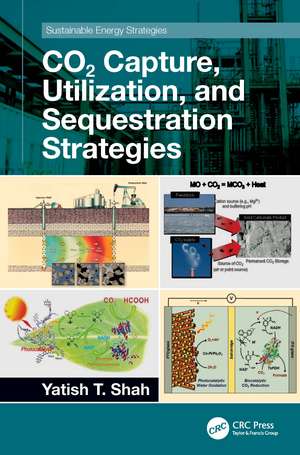CO2 Capture, Utilization, and Sequestration Strategies: Sustainable Energy Strategies
Autor Yatish T. Shahen Limba Engleză Hardback – 12 noi 2021
- Highlights current and potential future commercially viable CCUS strategies
- Discusses applications for direct and the more complex indirect utilization of CO2 streams
- Examines viability of the mineral carbonation process and biological treatments to convert CO2 into useful biochemicals, biomaterials, and biofuels
- Explores heterogeneous catalysis for thermal and electrochemical conversion and solar energy-based thermal, photo-thermal, and photocatalytic conversion of CO2
- Presents the rapidly growing concept of plasma-activated catalysis for CO2 conversion
| Toate formatele și edițiile | Preț | Express |
|---|---|---|
| Paperback (1) | 324.16 lei 6-8 săpt. | |
| CRC Press – 4 oct 2024 | 324.16 lei 6-8 săpt. | |
| Hardback (1) | 1109.18 lei 6-8 săpt. | |
| CRC Press – 12 noi 2021 | 1109.18 lei 6-8 săpt. |
Preț: 1109.18 lei
Preț vechi: 1352.65 lei
-18% Nou
Puncte Express: 1664
Preț estimativ în valută:
212.24€ • 221.59$ • 175.66£
212.24€ • 221.59$ • 175.66£
Carte tipărită la comandă
Livrare economică 04-18 aprilie
Preluare comenzi: 021 569.72.76
Specificații
ISBN-13: 9781032124803
ISBN-10: 1032124806
Pagini: 446
Ilustrații: 39 Tables, black and white; 92 Line drawings, black and white; 6 Halftones, black and white; 98 Illustrations, black and white
Dimensiuni: 156 x 234 x 25 mm
Greutate: 0.45 kg
Ediția:1
Editura: CRC Press
Colecția CRC Press
Seria Sustainable Energy Strategies
ISBN-10: 1032124806
Pagini: 446
Ilustrații: 39 Tables, black and white; 92 Line drawings, black and white; 6 Halftones, black and white; 98 Illustrations, black and white
Dimensiuni: 156 x 234 x 25 mm
Greutate: 0.45 kg
Ediția:1
Editura: CRC Press
Colecția CRC Press
Seria Sustainable Energy Strategies
Cuprins
1. Sources of Carbon Dioxide Emission and Possible Treatment Strategies. 2. Methods for Carbon Dioxide Capture/Concentrate, Transport/Storage and Direct Utilization. 3. Carbon Capture by Mineral Carbonation and Production of Construction Materials. 4. Biological Conversion of Carbon Dioxide. 5. CO2 Conversion to Fuels and Chemicals by Heterogeneous and Electrocatalysis. 6. Solar Thermal and Photochemical Energy Assisted Carbon Dioxide Conversion. 7. Plasma Activated Catalysis for CO2 Conversion
Notă biografică
Yatish T. Shah received his B.Sc in chemical engineering from the University of Michigan, Ann Arbor, USA, and MS and Sc.D in chemical engineering from the Massachusetts Institute of Technology, Cambridge, USA. He has more than 40 years of academic and industrial experience in energy-related areas. He was chairman of the Department of Chemical and Petroleum Engineering at the University of Pittsburgh, Pennsylvania, USA; dean of the College of Engineering at the University of Tulsa, Oklahoma, USA, and Drexel University, Philadelphia, Pennsylvania, USA; chief research officer at Clemson University, South Carolina, USA; and provost at Missouri University of Science and Technology, Rolla, USA, the University of Central Missouri, Warrensburg, USA, and Norfolk State University, Virginia, USA. He was also a visiting scholar at University of Cambridge, UK, and a visiting professor at the University of California, Berkley, USA, and Institut für Technische Chemie I der Universität Erlangen, Nürnberg, Germany. Dr. Shah has previously written nine books related to energy, six of which are under "Sustainable Energy Strategies" book series by Taylor & Francis of which he is the editor. He has also published more than 250 refereed reviews, book chapters, and research technical publications in the areas of energy, environment, and reaction engineering. He is an active consultant to numerous industries and government organizations in the energy areas.
Descriere
This book emphasizes carbon capture, utilization, and sequestration (CCUS) with special focus on methods for each component of the strategy. It details technologies available for utilization of CO2, showing how it can be a valuable renewable source for chemicals, materials, fuels, and power instead of a waste material damaging the environment.









